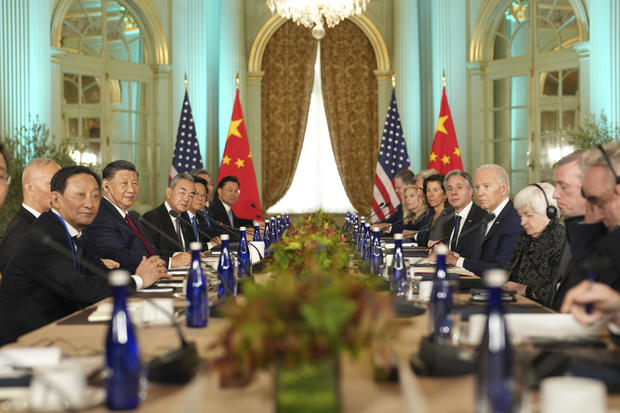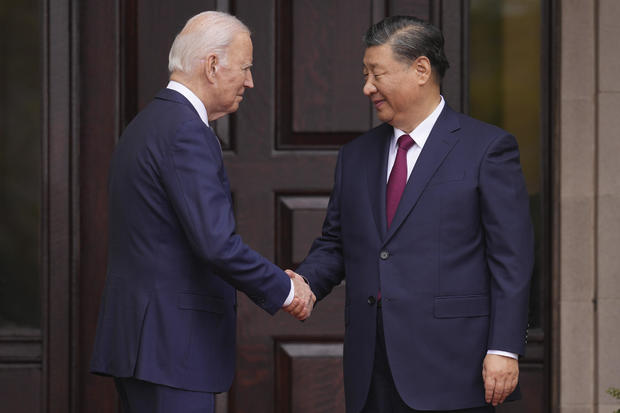Biden and Xi hold high-stakes meeting today in Northern California
President Biden and Chinese President Xi Jinping have begun talks Wednesday on the sidelines of the Asia-Pacific Economic Cooperation gathering, as Mr. Biden looks to manage the relationship between the world's two largest economies.
The two men grasped hands ahead of their bilateral meeting at the Filoli Historic House & Garden in Woodside, California, just outside of San Francisco. At the top of their bilateral meeting, Mr. Biden said there is no substitute for face-to-face discussions, and it's important to ensure that "competition doesn't veer into conflict."
"I value our conversation because I think it's paramount that you and I understand each other clearly, leader to leader, with no misconceptions or miscommunication," Mr. Biden said.
Through an interpreter, Xi called the China-U.S. relationship the most important bilateral relationship in the world, and said "turning our backs on each other is not an option."
The men aren't meeting one-on-one — each leader has about a dozen top aides in the grand room. Mr. Biden will hold a solo press conference after the bilateral meeting, although the conversation is expected to take hours.

It is Mr. Biden's second in-person meeting with Xi since he took office, although the two have also spoken virtually and Mr. Biden met with Xi many times before taking office. This is the first time they have spoken since their last meeting, which was in Nov. 2022 in Bali, Indonesia, a senior administration said Tuesday night.
Although the Biden administration has a number of goals for the meeting, key among them is the resumption of military communications, which were suspended after former House Speaker Nancy Pelosi visited Taiwan last year. Diplomatic lines of communication have continued.

"To get back on a normal course of corresponding, being able to pick up the phone and talk to one another if there's a crisis," Mr. Biden said Tuesday, asked what he would consider the outcome of a successful meeting with Xi. "Being able to make sure our militaries still have contact with one another."
A senior administration official noted early Wednesday that when the Chinese spy balloon went across the U.S., "we had no way really to communicate with the Chinese. That's not responsible and we hope to be able to at least take some preliminary steps tomorrow."
The senior administration official said "over the past several years there has been a "collection of power by one man – President Xi." The official added "frankly, if you really have to do serious diplomacy, that has to take place at the very top so the stakes really just couldn't be higher. And yes, I think if you want to affect change in the Chinese system, if you want to have a clear shot at trying to affect certain outcomes, it comes down to a meeting like this."
In any meeting at the leader level, particularly between countries like the U.S. and China, there are "weeks and weeks" of discussion about the agenda, said National Security Council spokesman John Kirby. Kirby said Mr. Biden and Xi have known each other for years, and can be "frank and forthright" with each other.
"I think the table's been set, again, over the course of many weeks, for what we hope will be a very productive, candid, constructive conversation here," Kirby said. "... He's not gonna' be afraid to confront where confrontation is needed on certain issues where we don't see eye to eye with President Xi and the PRC, but we're also not gonna' be afraid nor should we be afraid as a confident nation to engage in diplomacy on ways which we can cooperate with China."
Kirby said he has "no doubt" the topic of the Hamas-Israel conflict in the Middle East will come up in the discussion. He also reiterated that the administration doesn't support independence for Taiwan, but the administration still wants to see Taiwan's economy to continue to flourish.
Broadly, the White House says the administration's goals at the summit are improving and increasing American investment in the Asia-Pacific region and the region's investment in the U.S.; working toward better worker standards and cleaner environments; and building a more inclusive economy across the region.
"We're not trying to decouple from China," Mr. Biden told reporters Tuesday. "What we're trying to do is change the relationship for the better. From my perspective, if in fact the Chinese people, who are in trouble right now, economically ... if the average citizen in China was able to have a decent paying job, that benefits them and it benefits all of us. But I'm not gonna' continue to sustain the support for positions where if you want to invest in China, we have to turn over all our trade secrets."
- In:
- Xi Jinping
- Joe Biden

Kathryn Watson is a politics reporter for CBS News Digital based in Washington, D.C.
Disclaimer: The copyright of this article belongs to the original author. Reposting this article is solely for the purpose of information dissemination and does not constitute any investment advice. If there is any infringement, please contact us immediately. We will make corrections or deletions as necessary. Thank you.

